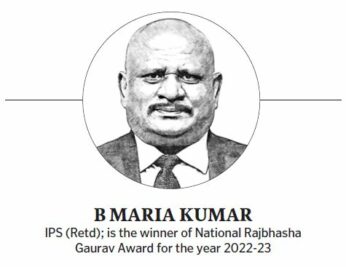In an equal society, positive experiences and delightful memories can set the stage for manifestation of uplifting dreams
Published Date – 26 January 2024, 11:56 PM

By B MARIA KUMAR
Do dreams truly hold the power to craft our destinies and alter the course of human history? Let’s embark on a journey through the dreams of giants such as the German scientist Friedrich August Kekulé and the American civil rights leader Dr Martin Luther King Jr, where the answer resounds with an emphatic “yes.” Picture Kekulé, the professional chemist, experiencing an epiphany in a dream where a tail-swallowing snake forms a circular shape, inspiring his groundbreaking conception of the hexagonal model of the benzene molecule. In the late 1860s, he mused, ‘let us learn to dream, … and perhaps we will know the truth.’ Fast forward nearly a century, and we find Dr King passionately declaring, ‘I have a dream,’ in a speech that would reverberate through history, rallying for the rights of black individuals.
Transformative Power
These instances highlight the profound impact dreams can have on human endeavours. Kekulé’s dream, rooted in chemistry, paved the way for a breakthrough in understanding the nature of organic compounds. Dr King’s dream, fueled by a commitment to nonviolent advocacy for social justice, ignited movements for equal treatment not just in America but even across the world. Dreams possess the transformative power to inspire and guide the trajectory of our progressive odyssey. In the entrepreneurial world, vision and mission statements serve as dream goals for business growth. The potency of these dreams often lies in real-life scenarios from which they emerge. Kekulé’s dream was steeped in the field of chemistry, given his profound expertise in it. Similarly, Dr King’s dream emanated from his acquaintance with human rights dynamics for securing constitutional freedoms for the black community. Businesses strategically chart their dream futures based on their professional know-how.
Reflecting on the nature of dreams when envisioning a good life prompts intriguing questions. Do dreamers need the capacity to dream to realise their aspirations? What if they lack the ability to dream simply because they may not be aware of what constitutes a good life due to factors like ignorance, illiteracy, inferiority and irrationality? So, the essence of a good life hinges on the intention and capability to aspire for and to dream, a la Stephen Hawking, of luxurious leisure. Beyond visualising self-actualisation, it also involves contributing to the greater good for ultimate contentment. The competence to dream well demands, among other things, knowledge and ambition about the purpose of life, setting meaningful targets and working towards a future that embodies one’s strategic strengths to achieve their all-round potential.
Crucial Conundrum
That being the case, a crucial conundrum springs forth: What if a socioeconomically challenged person finds it Greek to define how a good life or, for that matter, a good dream looks like? This troubling reality underscores the critical role of knowledge about and exposure to the essentials in nurturing the subconscious or the conscious for dreaming prospects. It is in this context that the principle of equitable equality takes on heightened significance in the realm of dreams. This proposition not only invites contemplation on social dynamics but also opens the door to various philosophical investigations, including intense ontological cogitations.
From the moment of birth, human existence is marked by an innate yearning for safety, security, stability, certainty and satisfaction in life. However, recognising this need in itself proves inadequate for a fulfilling existence. Imaginations for a good life must harmonise with practically conceivable realities. Predicaments often arise when imaginations falter, and people, to a significant extent, fail to grasp the extensive meaning of the beautiful present or the promise of a brighter future. Consider, for instance, a frog spending its entire life in a muddy, hostile well, blissfully unaware of the tranquillity that awaits in a distant serene lake. It will never be able to dream that a water body like a lake exists somewhere because it has no knowledge of it. Similarly, individuals leading insulated, harsh, and segregated lives may find it challenging to dream of smooth, enriching modern lives.
The realm of consciousness appears to vary considerably from person to person, playing a pivotal role in fostering awareness. Greater awareness, in turn, expands the peripheral limits of sociopolitical as well as techno-economic consciousness towards ambition for inclusivity. A plethora of studies attests to how environmental influences forge attitudes, giving rise to diverse behavioural patterns and unique perceptions. These facts bring us to Harvard professor Michael Sandel’s fervent advocacy for the right to equality of conditions.
Being Equal
Sandel contends that significant betterments in the human condition are achievable only when the equality of conditions is realised, particularly for the unfortunate and disadvantaged individuals on a global scale. He argues that effort and merit alone are insufficient to propel individuals towards success because luck and chance will have their own impact, especially in providing a wide variety of opportunities for marginalised populations with similar socioeconomic conditions as the more fortunate.
A parallel philosophy, championed much earlier by Dr Ambedkar, the visionary architect of the Indian Constitution, focuses on social equality and underscores the importance of an equal head start for all. The idea encapsulated in Vasudhaivakutumbakam implies that all humans should be equitably placed on the same playing field, as they are considered part of one single global family. In such equivalent atmospheres, positive experiences and delightful memories can set the stage for the manifestation of uplifting dreams. Conducive circumstances will pave the way for ensuring the right to equitable equality in envisioning and enjoying a good life. And so, constructive dreams, as demonstrated by the powerful utterances of Kekule and Dr Martin Luther King Jr, will unquestionably become instrumental in sculpting destinies that are not just positive but genuinely glorious.
Dr Ambedkar, the visionary architect of the Constitution, focuses on social equality and underscores the importance of an equal head start for all





